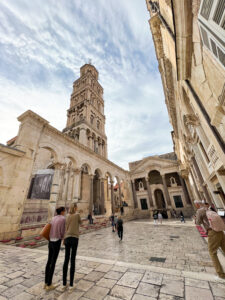

As a travel advisor and custom study abroad program manager, I spend A LOT of time researching travel accommodations. The convenience of online booking platforms makes it easier than ever to find any accommodation type you can dream of, from luxury resorts to homestays with locals.
I spend a lot of time thinking about the logistics of travel and the details that most of us prioritize when searching for accommodations like price and location. But the more I travel myself and the more work I do in the travel industry, the more I think about the ethics of it. Having lived in tourist destinations like New York City, Washington D.C., and New Orleans has shown me the effect that tourism can have on a city’s residents, for better and worse.
And so, I’ve decided it might be helpful for me to write a brief guide on how to choose the best accommodations when you travel. Of course, what’s best for one person may not look the same as what’s best for someone else, but these are some things to consider when deciding where to stay.
I’ll talk about the two most popular accommodations types (hotels and short-term private resident rentals) below, but first I want to mention a few things to pay attention to that are relevant no matter what types of accommodation you’re considering.
This post may contain affiliate links which earn me a small commission from bookings at no extra cost to you. Thank you for reading and supporting my blog!

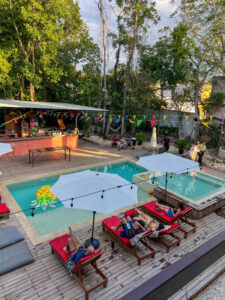
A Note on Occupancy Rules (for Hotels and Short-Term Rentals)
In the United States, most of us don’t pay much attention to occupancy limits listed on booking websites. Hotel rooms are often very different sizes in the US than they are in European countries, and so are the standard bed sizes. In the US, if we book a hotel room with two beds, we generally assume this can sleep 4 people. In Europe, especially in the UK, you CANNOT assume this. Many hotels have very strict limits on the number of people allowed per room, regardless of the guests’ ages. I once looked at hotel room for clients in London that had two double beds because I assumed this would be perfectly fine for a couple and two young children. But the hotel occupancy limit was 3 people per room. Upon reaching out to double-check with the hotel, they let me know that this would not be allowed, and that even infants count toward the occupancy limit.
I’ve read many accounts of travelers being unaware of how strict these rules are and unexpectedly having to pay large fines when the hotel asked to see every guest’s passport at check-in. These hotels expect guests to rent adjoining rooms and pay double the price. (It has to do with fire codes, supposedly.) Pay close attention to the listed room limit, and when in doubt, get explicit written permission that a hotel will allow your number of guests. And if they won’t, just look for family-friendly options instead.


I’ve also seen similar issues arise with short-term rentals through Vrbo and Airbnb in the United States (and presumably everywhere). This is especially true when booking for large groups. When renting a large house for several families, you may be imaging a scenario where guests can bring in some air mattresses to allow for kids to sleep in bedrooms with their parents. And, of course, the properties have no control over where people are physically sleeping, but they DO have control over the occupancy limits. Even if a house had 8 king-size beds in it, if the listing says that only 10 guests are allowed, you need to get permission to bring even one additional person. I’ve had property owners tell me that it’s due to estimated cost of water and electric usage, not whether more people can comfortably fit. I’ve also heard cases of outdoor security cameras catching instances where guests try to fit more people than allowed. Don’t risk it.
Refundable vs. Nonrefundable
There’s no default as to whether accommodations are refundable or nonrefundable—every accommodation decides this for themselves. One of the most important things to look at when booking a trip is the rules around refunds. No matter how certain you are that you’re going on a trip and do not need a refundable room, things happen that are simply outside of our control. You don’t want to put yourself in a position where a family emergency or unexpected illness puts you at major financial risk. Often, a property will offer a cheaper nonrefundable price or a more expensive refundable price for the same room. In my opinion, it is ALWAYS worth paying more for peace of mind. And if a room is out of my price range when I add the refundable fees, I simply won’t book that room.
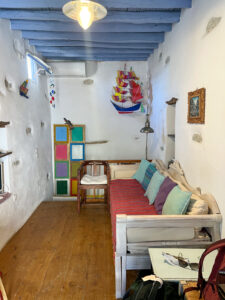
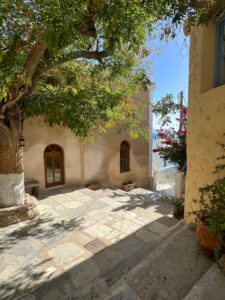
Location and Prices
This seems obvious, but it can be easy to overlook if you’re in a rush or feeling stressed about a tight budget. Accommodations outside of a city center are nearly always cheaper than those in the city center. We all know that it saves us money to be farther away from a destination’s main attractions. But it actually takes a bit of research to determine just how much, if any, money you’re really saving by opting for the cheaper accommodations that are farther away. Is the cheaper hotel a 2-minute walk from a metro line which makes public transportation easy and affordable? OR are you saving $50 per night on your hotel by staying in a place that will require you to pay $50 on a taxi/Uber to get anywhere you want to be each day? Does the more expensive hotel offer free breakfast and a free hotel shuttle? Is the more expensive room fully refundable while the cheaper room is not? Don’t let the excitement over what appears to be a good deal cause you to forget to consider all the details.


Some words about the two most popular accommodations options:
Hotels
Hotels are the default accommodation for many travelers, and there are hotels that meet nearly every budget and need.
Some pros for choosing a hotel:
- 24/7 customer service (Though this isn’t a given. Some hotels are only staffed at certain hours, so be sure to confirm this if it’s an amenity you want.)
- Safety/security
- Typically include some amenities. This could be breakfast, a pool, a gym, a spa, shuttles, or room service.
- Often found in convenient and central locations
- You can typically drop off luggage earlier than your check-in time and store it for a few hours after check-out time.
There are some obvious things that most of us look at when searching for a hotel: price, location, and reviews. But what I used to think a lot less about was where my money was going. Tourism can have a positive impact on the local economy, but only if travelers pay attention to how they spend their money.

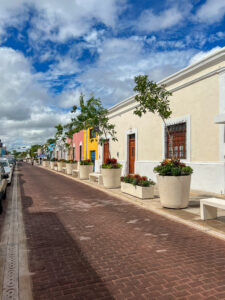
Chain Hotels vs. Locally Owned Hotels
International hotel chains can be convenient options because customers come to trust a certain brand. But for most international chains, most of the money guests spend on accommodations doesn’t go to the local economy, and many of them take away business from locally owned competitors.
Some international chains do a much better job of addressing this than others and have social initiatives to give back to the local economy. They may only hire locals or source their food from local growers. (If these initiatives are important to them, they’ll make it clear on their website.) There are times when staying at an international chain hotel makes the most sense, like if you’re using hotel reward points. In that case, you can contribute to the local economy in other ways like eating in local restaurants instead of chain restaurants. (I’m willing to bet that you will not regret skipping the Hooters in Cancun, for example.)
If possible, locally owned hotels are the best options for making sure your money goes to the local economy. There are incredible family-run hotels, inns, and bed and breakfasts that can give you a unique and less commercial travel experience.

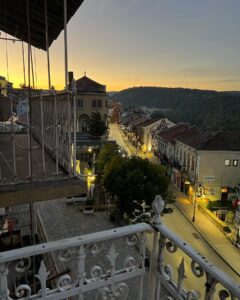
All-Inclusive Resorts
Travelers who are looking for a stress-free trip focusing on relaxation with little required planning often enjoy all-inclusive resorts. There are a lot of reasons all-inclusives are attractive to guests. They provide activities and dining options, and they often provide substantial security which many guests find comforting.They are generally easy and convenient.
Unfortunately, all-inclusive hotels have historically had a less-than-great reputation for their impact on the local economy. Many of them provide poor wages for local workers, and some privatize beaches so locals can no longer access the beach where they live. Some of the huge resorts take over entire communities and drive local people out.
BUT this is starting to change. More and more resorts are moving toward socially and environmentally responsible initiatives. As with all hotels, look at their websites and reviews. For an example of what I mean, see the Sandals Resort website’s page devoted to their environmental practices, their preservation efforts, and their sustainability policy. If a hotel makes efforts like these, they will not hide it. If they don’t mention it, they probably aren’t doing it.


Sustainability
No matter what kind of hotel you stay in, it’s always great to keep sustainability efforts in mind. Again, it will be obvious if a hotel prioritizes this. You can look for a mission statement or a dedicated space on their website where they talk about sustainability initiatives. There are also a number of certifications a hotel can have that signifies their commitment to sustainability. You may see certifications like Green Key, Earth Check, or LEED. But keep in mind, it takes a lot of money to invest in gaining certifications like these, so just because a property doesn’t have one of these certifications doesn’t mean they aren’t striving to do the same thing as a hotel that does. Look at their website and their reviews. Do they have a recycling or compost program? Do they mention water usage or energy consumption? It won’t be hard to tell.
Why does it matter?
Hotels use an enormous amount of resources and energy to operate. They also produce an enormous amount of waste. Some hotels, especially large resorts, have impacted the water supply in their communities. The waste they produce has a negative impact on their surroundings. They may displace residents with land development and drive up housing costs. The more we can do to protect local communities and the environment, the better.
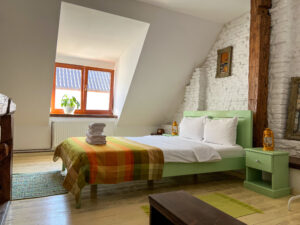

Vacation Homes (Airbnb and Vrbo)
There are many other companies that provide short-term home rentals, but Airbnb and Vrbo are the top two competitors, so I’m focusing on them. They’re similar in many ways. Both offer short-term private residences for rent. (Vrbo exclusively offers private residences, but Airbnb gives you the option of a private residence OR a room in a shared residence.) There are a lot of cross-listings where you’ll see the same property listed on both sites. Vrbo typically has lower service fees, and Airbnb has more accommodations listed.
Some pros for choosing a vacation home:
- Attractive for long stays and remote workers
- Many include kitchens and multiple bedrooms
- Allow guest to feel like they’re “living locally”
- Unique and more personalized accommodations
- Privacy (If you’re selecting the full home.)
- Can be a bit cheaper than a hotel, though this is becoming less of a norm
Vacation homes through websites like Airbnb and Vrbo are very controversial in the travel industry. On one hand, they are wildly popular and offer one-of-a-kind travel accommodations that travelers love. On the other hand, the rise of short-term rentals has had a massive negative impact on local economies, especially in popular cities. They’ve caused issues of housing shortages and drastically rising housing costs for locals.
Some travelers stay away from Airbnb (which has the most short-term rental listings) entirely. My opinions about this has evolved and shifted and continues to change as I watch how Airbnb and cities around the world address these issues.

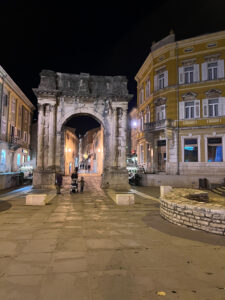
Many popular tourist cities have cracked down on the rules and regulations for these short-term rentals, and I think this is a good thing. Cities like Paris, Barcelona, Berlin, London, Amsterdam, Lisbon, and San Francisco have put very strict rules in place about how these properties can operate and where. Some only allow a home to be rented out 90 days of the year, some require duration minimums, some require homeowners to live in the accommodations and only do room-rentals, and some limit the number of rental properties allowed to operate. Some cities have zoning rules that restrict where Airbnbs can be. (For example, Airbnb is no longer allowed in Florence’s historic center. New Orleans has a similar rule in the French Quarter that only allows for some exceptions.)
I personally feel much better using Airbnb in places where I know it’s heavily regulated and restricted because this means that the accommodation has been vetted. It also means that short-term rentals in those cities are prevented from putting the same kind of strain on the community that they would be if allowed to operate without these restrictions.
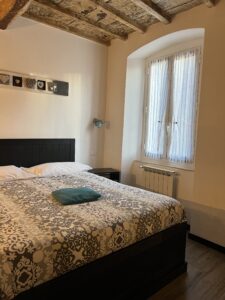
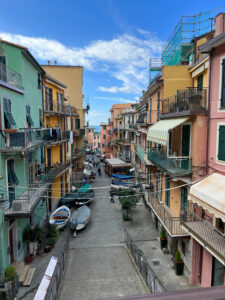
I think choosing a short-term rental means a few extra precautions. Some things to consider when deciding if you want to choose an Airbnb/Vrbo and if so, how to pick the best one:
- Look for properties that aren’t owned or managed by a profit-oriented management business. Sometimes it can be hard to tell, but often there are obvious signs. Some of them have a company logo on their photos. If you do a Google image search, you can sometimes find the management company website. If you message back and forth with a property and a different person replies every time, that’s not a great sign. Often these management businesses function like big corporations. Sometimes the owners don’t even live in the same country where the property is located. This isn’t who you want to give your money to.
- Click on the profile of the property’s owner. You can see how many properties they own and read reviews of them. If it’s just a local individual who has a home or two that they sometimes rent out, I feel okay about giving them my money. Reviews will also help you find out. Are there reviews that say the owner picked them up from the ferry on the Greek island, personally drove the guests to the house, and showed them a map of her favorite places? (This happened to me in Naxos.) Are there reviews that say the washing machine broke and the owner invited the guests into her home next door to wash their clothes? Did the owner bake the guest cookies? These types of personal touches mean the property is probably not managed by a big management company. These are people who want to welcome you to their community and who I want to support.
- Do a Google search to see how what your destination city’s relationship with Airbnb is. For example, my own city, New Orleans, has a very negative relationship with short-term Airbnb rentals, and I almost never recommend that guests look at Airbnb options here unless they are digital nomads planning to stay for a month or more. This varies from city to city, and in cities that struggle with issues of overtourism, you can be almost assured that locals don’t like Airbnb.
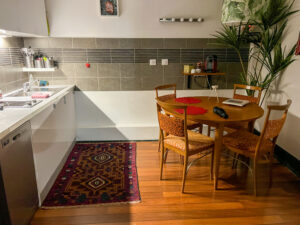

That being said, Airbnb DOES offer rooms in shared homes, and I wish more people took advantage of this! This functions sort of like a homestay where you stay in a spare bedroom of the person residing on the property. Often these hosts are very personable and want to give you the best experience of their city. This is usually an extremely affordable accommodation option, and it doesn’t put strain on a city’s resources in the same way that renting a full private residence does.
Also, Airbnb offers Airbnb Experiences in addition to accommodations. These are activities/experiences/tours led by locals, and I highly recommend looking into them if you haven’t yet! This is a great way to contribute to the local economy and engage in local culture.
**It’s also worth noting that hotels, bed and breakfasts, and hostels can all post on Airbnb. So even though most guests are looking for private residences on the site, the site actually offers a wide variety of accommodation options.

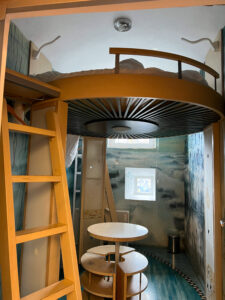
Alternatives to Short-Term Rentals and Hotels
I’ve only focused on a couple of accommodation types in this blog, but there are so many more options for travelers of all budgets.
-
Hostels
Most of you know about my love for hostels. Hostels operate very similarly to hotels, but more hostels are locally owned. They are an excellent way to contribute to the local economy, offer excellent resources, and sometimes have amenities as nice as those of boutique hotels. I encourage everyone to consider hostels if you never have. (And see these blog posts for some of my favorites in Europe and Mexico.)
-
Homestays
Homestays are not just for study abroad students! They’re a very neat way for travelers of all ages to stay with a local family and fully immerse themselves in a new culture. There are several platforms that help you find homestays, like this one.
-
Home exchanges
Yes, like in the movie The Holiday. That’s a real thing you can do! Several platforms offer it, like this most popular one.
-
Housesitting or pet sitting
At Trusted Housesitters, you can stay for free in someone’s home in exchange for pet-sitting for them. People travel the world for free just by pet-sitting!
-
Work exchanges like through Workaway and Worldpackers
These work exchanges allow you to volunteer in exchange for free accommodations. The accommodations vary a lot from opportunity to opportunity, but many of them include full room and board. They might be in a private room or a shared room. And some offer additional perks, as well. Volunteer opportunities range from working in a hostel to language tutoring to teaching yoga to working at an animal rescue.
And of course, I’m happy to help you find the best accommodations for you! Reach out to me for any assistance with trip planning!

